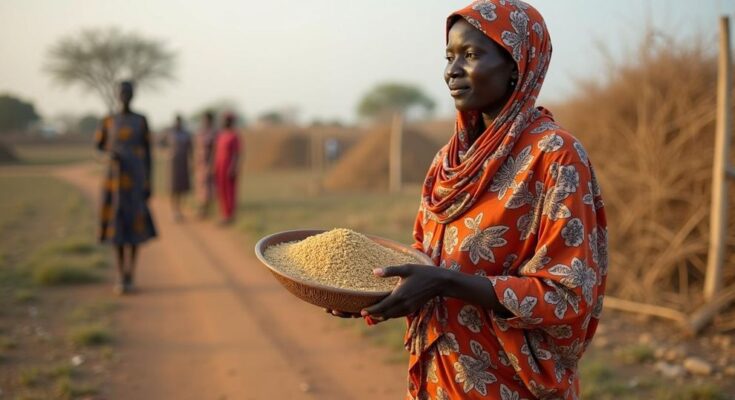The World Health Organization reported alarming levels of starvation in Sudan, exacerbated by civil war and displacement since April 2023. WHO Director-General Dr. Tedros Adhanom Ghebreyesus stated that approximately 25 million individuals are in need of assistance, emphasizing the low global attention to the crisis, which he believes is influenced by racial disparities in humanitarian responses. The conflict has roots in a coup from 2021, complicating peace efforts worldwide.
Starvation in Sudan, ravaged by civil conflict since April 2023, has reached alarming levels, with the World Health Organization (WHO) reporting that the condition is “almost everywhere” in the country. Dr. Tedros Adhanom Ghebreyesus, WHO’s Director-General, expressed grave concern about the humanitarian crisis during an interview with the BBC’s Today programme. He highlighted that displaced persons have reached unprecedented numbers, with over 12 million individuals forcibly uprooted due to ongoing violence between Sudan’s army and the paramilitary Rapid Support Forces (RSF). Dr. Tedros described the scene he encountered during his visit to Sudan, revealing that many children appeared severely malnourished, showcasing the dire state of health services available in the region. He stated, “Imagine: destruction, displacement, diseases everywhere, and now famine.” With close to 25 million people—or roughly half of the Sudanese population—requiring urgent assistance, he emphasized the need for heightened global awareness regarding the crisis, which he believes is disproportionately influenced by race. He lamented that the international community’s focus on Sudan has been overwhelmingly insufficient, notably in comparison to current attention towards conflicts in other regions, citing the disparity witnessed post-Russia’s invasion of Ukraine in 2022. Dr. Tedros articulated that the responses to various humanitarian crises in Africa do not receive dignified consideration, saying, “Especially in Africa, I think the attention is really, really low.” He urged for increased media coverage to illuminate the tragedy unfolding in Sudan. The conflict’s roots can be traced back to a coup in 2021, when military leader Gen. Abdel Fattah al-Burhan and RSF chief Mohamed Hamdan Dagalo initially allied but later fell out, precipitating a civil war. Mediation attempts by Saudi Arabia and the United States have yet to yield significant results. The looming humanitarian disaster has also prompted international scrutiny of the alleged support the RSF receives from the United Arab Emirates (UAE), a claim the UAE has refuted. Moreover, a UN-endorsed committee recently declared a famine within a displacement camp accommodating approximately 500,000 individuals in Darfur, one of the areas heavily impacted by ongoing hostilities.
The humanitarian crisis in Sudan stems from a civil war that erupted in April 2023, characterized by brutal clashes between the Sudanese army and the paramilitary Rapid Support Forces (RSF). With a staggering number of displaced individuals, the conflict has resulted in widespread starvation and suffering, particularly affecting children and vulnerable populations. Dr. Tedros Adhanom Ghebreyesus of WHO has called attention to the international community’s inadequate response to the crisis, drawing parallels with the attention given to other global conflicts, particularly in Europe, compared to those in Africa. Historical tensions between military factions in Sudan have exacerbated the current turmoil, complicating the prospects for peace and humanitarian assistance.
The situation in Sudan presents a grave humanitarian disaster, characterized by widespread starvation and displacement. Dr. Tedros Adhanom Ghebreyesus has effectively highlighted the urgent need for global awareness and a more equitable allocation of resources for humanitarian aid across conflicting regions. The ongoing civil war, along with the lack of sufficient international attention, poses a significant challenge not only to the 25 million people in dire need of assistance but also to the stability of the region as a whole.
Original Source: www.bbc.com




